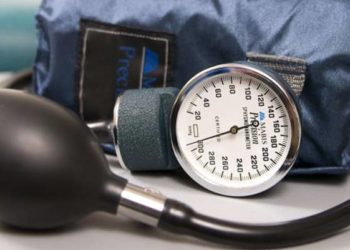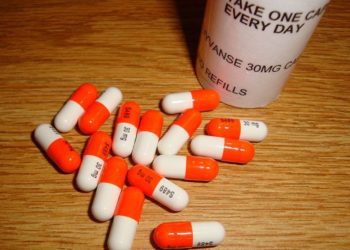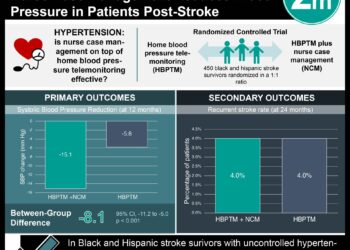Moderate sodium intake optimal for cardiovascular health
1. Compared to higher and lower levels of estimated sodium intake, a moderate sodium intake of 3 g to 6 g per day was associated with a lower risk of death or cardiovascular events.
2. Compared to a low level of estimated potassium intake (<1.50 g per day), higher levels of estimated potassium intake were associated with a lower risk of death or cardiovascular events.
Evidence Rating Level: 2 (Good)
Study Rundown: Despite the common recommendation of maintaining a low sodium diet in order to lower blood pressure and prevent cardiovascular events, the optimal range of sodium intake for cardiovascular health remains a controversial topic. Previous observational studies have even shown an association between low dietary sodium intake and increased risk of cardiovascular disease and death, potentially thought to be mediated through activation of the renin-angiotensin-aldosterone system. The Prospective Urban Rural Epidemiology (PURE) study is a large, international, prospective cohort study involving over 100,000 subjects aimed at better understanding the epidemiologic association between dietary sodium and potassium and the risk of cardiovascular disease.
In this study, an estimated sodium intake of 3 g per day to 6 g per day (considered a middle level of consumption) was associated with a lower risk of death or cardiovascular events than both a lower and higher level of intake; the authors describe a J-shaped association between estimated level of sodium intake and cardiovascular outcomes. Intake was estimated on the basis of a single measurement of urinary sodium excretion. Furthermore, compared with a lower level of estimated potassium intake, higher levels of estimated potassium intake (>1.50 g per day) were associated with a lower risk of death or cardiovascular events.
Strengths of this study include (1) the large number of subjects drawn from a broad geographic area and various social, demographic, and economics strata; (2) the effort to transparently adjust for a number of potential confounders through logistic regression models; and (3) accounting for reverse causality by repeating analyses in subgroups excluding patients with cancer and prior cardiovascular disease. Given the observational nature of the study, the primary drawback is that it may still be subject to unmeasured confounding. Other drawbacks include the absence of direct measurement of 24-hour urinary excretion and the lack of an intervention component to investigate the direct effects of sodium and potassium dietary balance on the outcome of interest.
Click to read the study, published today in NEJM
Click to read an accompanying editorial in NEJM
Relevant Reading: Salt in Health and Disease – A Delicate Balance
In-Depth [prospective cohort]: This large-scale, prospective cohort study probed the epidemiologic association between sodium and potassium intake levels and cardiovascular outcomes. The study involved 101,945 participants from 17 countries across 5 continents with varying socio-demographic characteristics who were followed for a mean of 3.7 years. Sodium and potassium intake were estimated using morning fasting midstream urine samples. The primary outcome was the composite of death from any cause and major cardiovascular events, which occurred in 3317 participants (3.3%). The primary logistic regression models adjusted for age, sex, educational level, ancestry (Asian vs. non-Asian), alcohol intake, BMI, diabetes mellitus status, history of cardiovascular events, and current smoking.
Compared to the reference category (4.00 to 5.99 g per day of sodium excretion), estimated sodium excretion of 7.00 g per day or more was associated with an increased risk of the primary outcome (odds ratio, 1.15; 95% CI, 1.02 to 1.30). This relationship was attenuated when additionally adjusted for blood pressure and prior diagnosis of hypertension. Compared to the reference category, estimated sodium excretion of less than 3.00 g per day was also associated increased risk of the primary outcome (odds ratio, 1.27; 95% CI, 1.12 to 1.44). Compared with the reference category (less than 1.50 g per day of potassium excretion), higher estimated potassium excretion was associated with a significantly reduced risk of the primary outcome. The authors reported a J-shaped association curve between estimated sodium intake and risk of the primary outcome, with the lowest risk of the primary outcome occurring in the mid-level sodium consumption group. In subgroup analyses, hypertension at baseline modified the association between a high estimated sodium excretion and the composite outcome (P=0.02 for interaction).
More from this author: Darapladib not effective in optimized, stable coronary heart disease patients, Letermovir safe, effective in CMV prophylaxis following stem-cell transplantation, Combination CPAP, weight loss for obstructive sleep apnea offer no added benefit, Tofacitinib superior to methotrexate monotherapy for rheumatoid arthritis, Gene mutation associated with antimalarial resistance across Southeast Asia
Image: PD
©2012-2014 2minutemedicine.com. All rights reserved. No works may be reproduced without expressed written consent from 2minutemedicine.com. Disclaimer: We present factual information directly from peer reviewed medical journals. No post should be construed as medical advice and is not intended as such by the authors, editors, staff or by 2minutemedicine.com. PLEASE SEE A HEALTHCARE PROVIDER IN YOUR AREA IF YOU SEEK MEDICAL ADVICE OF ANY SORT.







